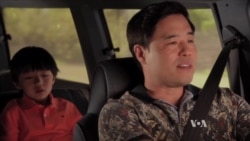It’s been two decades since a major American network television show featured Asian-American characters. Margaret Cho’s situation-comedy, “All-American Girl,” about a Korean-American punk-rock teenager and her conservative immigrant family was canceled in 1995 after just one season.
So it’s not surprising that Asian-American viewers have responded with excitement to “Fresh Off the Boat,” a new sitcom on the ABC network. Set in the mid-1990s, the show begins as 11-year-old Eddie Huang's Taiwanese-American family - father, mother, younger brothers and grandmother - move from Washington, DC’s Chinatown to Orlando, Florida.
Eddie’s father, played by Randall Park, has bought a steakhouse, and his mother, played by Constance Wu, sets about becoming a real estate agent. Orlando is an alien, almost all-white culture, and the Huangs meet both awkward friendliness and blunt prejudice - both played mostly for laughs.
Eddie, played by Hudson Yang, has to cope with being different in a new, mostly white school. Other kids are disgusted by his Chinese food lunches, so he switches to what they eat - sandwiches prepackaged in plastic. He loves hip-hop and identifies with black pop culture, but doesn’t fit in with African-American kids, either. A black classmate pushes him aside in the cafeteria, and calls him by the racial slur “chink.”
“Get used to it,” he barks at Eddie, “You’re the one at the bottom now.”
To Herb Tam and his friends, who’ve been gathering to watch the show every week at a restaurant in New York’s Chinatown, “Fresh Off the Boat” is a defining event. Tam, the curator at New York’s Museum of Chinese in America, compares it to the moment when Chinese-American basketball player Jeremy Lin vaulted to fame.
“We all thought it was a big, important moment in Asian-American history, as far as we’ve been around,” he said. “That sense of elation that one of us had finally made it onto this big stage, that there was this depiction of Asian-American life that resonated not just with us, but clearly with non-Asians, too. It’s this sense that we’ve been isolated and that people don’t get us that’s finally been alleviated in this one arena.”
His friend, City Council employee Vincent Fang, calls it a rebirth. “Asian-Americans have always played a supporting role on TV, but they have never been the main characters, and this is just one of those -- it’s iconic, and I think that it’s a moment for our community to shine, for us to see one of our own on TV,” he said.
“Fresh Off the Boat” is based on a much rawer, angrier memoir by Taiwanese-American celebrity chef Eddie Huang, about his experiences growing up in Orlando. His parents were far stricter, even harsh, and he learned to fight at an early age. Initially, Huang objected to the watering down of his story in “Fresh Off the Boat,” which he narrates in voiceover as the grown up Eddie, comparing it to sickly sweet Chinese-American food calibrated for white, middle American tastes.
He refused, as he wrote in a New York magazine essay, to read a line in which Eddie was supposed to say, “America IS great!” Ultimately, he rewrote the line to, “America ain’t three-fifths bad,” referring to the fraction of personhood that the U.S. Constitution assigned to black slaves.
“Randall was neutered, Constance was exoticized, and Young Eddie was urbanized,” Huang wrote of the show, saying it feeds the “pathogenic stereotypes that still define us.”
When Huang saw the first episode, with the defining “chink” insult uttered at Eddie in the cafeteria, he changed his mind. “I felt some truth in it for those three minutes,” he wrote, calling them the “holy trinity” of everything Asian-Americans had sacrificed for in order to gain a voice in American culture - even one that is only now beginning to be heard.
Vincent Fang and Herb Tam said they also initially feared that the show would neuter Asian-American experiences.
“I was worried they would get it wrong, that the accents wouldn’t be faithful, that they would reinforce stereotypes,” Tam said. “But after the first episodes, it was clear that the writing, the production, the acting was quite strong, and did in many ways a really good job of representing a certain kind of Asian-American experience. Most importantly, it was funny, and I think the show will live and die on whether it’s actually funny and entertaining.”
“I think it allows all of America to see that we are like them, we’re not just the Kung Fu master or the geeky [socially inept] guy who wins the math contest, but we’re well rounded characters,” Fang said. “You know, Eddie has the same childhood as the kid who lived down the block. And I think the show also does a good job of showing the subtle racism that a lot of Asian-Americans grow up feeling and experiencing. I certainly felt it when I was growing up. I certainly had people use the word 'chink' on me.”
“I would like to see more "controversial moments,” Fang said, but added, “I understand why it has to be watered down so it is acceptable, so that not just Asian-Americans will watch it, so the rest of America will, too.”
More than enough Americans, of whatever ethnicity, do seem to be watching. For many weeks, “Fresh Off the Boat” has been the most popular network show in its time slot, pretty much guaranteeing that it will be renewed for next year.
NEW YORK —





